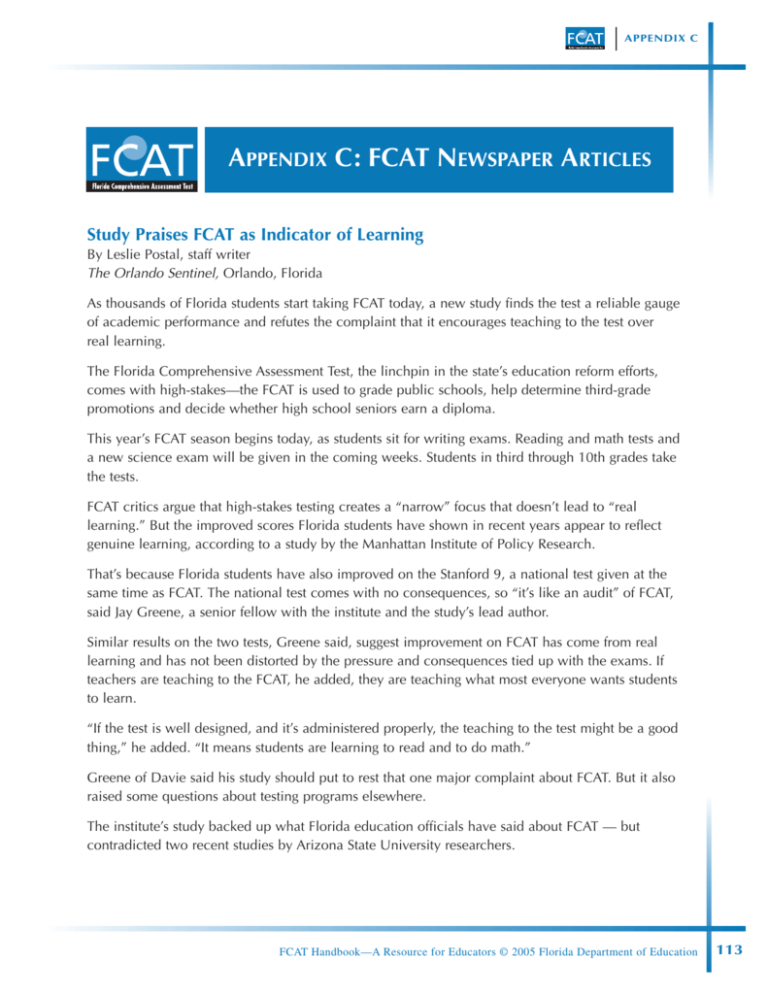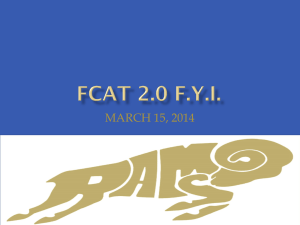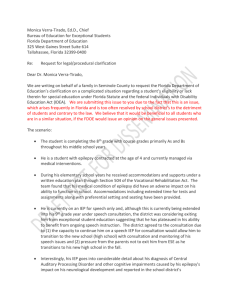
APPENDIX C
APPENDIX C: FCAT NEWSPAPER ARTICLES
Study Praises FCAT as Indicator of Learning
By Leslie Postal, staff writer
The Orlando Sentinel, Orlando, Florida
As thousands of Florida students start taking FCAT today, a new study finds the test a reliable gauge
of academic performance and refutes the complaint that it encourages teaching to the test over
real learning.
The Florida Comprehensive Assessment Test, the linchpin in the state’s education reform efforts,
comes with high-stakes—the FCAT is used to grade public schools, help determine third-grade
promotions and decide whether high school seniors earn a diploma.
This year’s FCAT season begins today, as students sit for writing exams. Reading and math tests and
a new science exam will be given in the coming weeks. Students in third through 10th grades take
the tests.
FCAT critics argue that high-stakes testing creates a “narrow” focus that doesn’t lead to “real
learning.” But the improved scores Florida students have shown in recent years appear to reflect
genuine learning, according to a study by the Manhattan Institute of Policy Research.
That’s because Florida students have also improved on the Stanford 9, a national test given at the
same time as FCAT. The national test comes with no consequences, so “it’s like an audit” of FCAT,
said Jay Greene, a senior fellow with the institute and the study’s lead author.
Similar results on the two tests, Greene said, suggest improvement on FCAT has come from real
learning and has not been distorted by the pressure and consequences tied up with the exams. If
teachers are teaching to the FCAT, he added, they are teaching what most everyone wants students
to learn.
“If the test is well designed, and it’s administered properly, the teaching to the test might be a good
thing,” he added. “It means students are learning to read and to do math.”
Greene of Davie said his study should put to rest that one major complaint about FCAT. But it also
raised some questions about testing programs elsewhere.
The institute’s study backed up what Florida education officials have said about FCAT — but
contradicted two recent studies by Arizona State University researchers.
FCAT Handbook—A Resource for Educators © 2005 Florida Department of Education
113
APPENDIX C
Audrey Amrein, one of the Arizona researchers, contends high-stakes tests have become an “easy
way to control what’s going on in the schools,” though they haven’t led to real progress.
Her studies compared results on high-stakes state tests with results on national tests, such as the
SAT, Advanced Placement exams and the National Assessment of Education Progress. They found
states with high-stakes tests had made little gains, or had posted declines, on these national exams.
Their results for Florida, however, were not clear-cut.
Greene criticized those studies, saying it didn’t make sense to compare scores on tests only
college-bound students take with scores on yearly state tests almost everyone takes.
His study looked at high-stakes and low-stakes tests given to the same groups of students at the
same time. The study looked at Florida and Virginia and at seven school districts including Boston
and Chicago.
In both states and all the districts, the standardized tests were an accurate measure of student
performance. But only in Florida did the high-stakes tests also accurately measure a school’s role
in student achievement from year to year.
Copyright 2003 Sentinel Communications Co. All Rights Reserved. The Orlando Sentinel (Florida), February 11, 2003
Tuesday, FINAL LOCAL & STATE; Pg. B5.
114
FCAT Handbook—A Resource for Educators © 2005 Florida Department of Education
APPENDIX C
Educators Help Shape FCAT
Three locals attend sessions to ensure test’s effectiveness
By Kimberly C. Moore, staff writer
Florida Today, Brevard County, Florida
MELBOURNE — Psssst. Want to know a secret?
Three local educators are involved in the super-secret, ultra-secure process of helping to
develop the Florida Comprehensive Assessment Test. It’s the same test Gov. Jeb Bush jokingly
refers to as “dreaded and hated” but seriously touts as a way to save Florida students from years
of broken dreams.
Edgewood Jr./Sr. High school teacher David Bradford, Madison Middle School administrator
Fielding Hossley and Apollo Elementary School teacher Marie Clifford recently participated in
sessions to rewrite, rework or revisit FCAT questions on the reading, writing and math tests.
Bradford joked that like a CIA operative, he could tell you what the test questions are — but then
he’d have to kill you.
“The security was very impressive,” Bradford said. “We were sworn to secrecy and read the state
law. There were no armed guards, but every scrap of paper was picked up. We signed in and out,
and the conference rooms were locked.”
Inside those locked rooms were groups of six panelists consisting of teachers “on the front lines” in
Florida classrooms. They read every question, sometimes a dozen times, to ensure it was
appropriate for the grade level being tested, free from slang or slurs and not offensive. They
reviewed the answers.
They took the test. In the end, they threw out some questions and answers and reworded others.
Their mission was to ensure that questions adhered to Sunshine State Standards, the benchmark of
what students are supposed to be learning at different grade levels.
“We don’t want the questions to be the test,” Hossley said. “We want to determine whether the
student understood the reading task that was being assessed.”
Bradford and Hossley said a priority was making sure each word in each question and answer was
appropriate for the grade level tested.
“For instance, a question might ask, “What is your opinion of the way the author described Johnny?’“
Hossley said. “If this was a third-grade test, the student might not understand the word ‘opinion.’“
Both say they appreciate the FCAT and how the test aims to pinpoint students’ academic
weaknesses. The results can assist teachers in helping students strengthen skills.
FCAT Handbook—A Resource for Educators © 2005 Florida Department of Education
115
APPENDIX C
“I was an outspoken critic of high-stakes testing, and I came home with a whole different view of
it,” Bradford said. “This test is fair, it’s unbiased and it’s sensitive to what’s happening in our own
state and our communities.”
Hossley said he agrees.
“I think it’s a good test and a good measure of what we’re supposed to be teaching students,”
Hossley said. “Although the political side of it, I have some concerns with.”
Editor’s Note:
David Bradford has served on the FCAT Reading Item Review Committee.
Marie Clifford has served on the FCAT Science Item Review and Science Performance
Review Committees.
Fielding Hossley has served on the following FCAT committees: Writing Content Advisory, Writing
Rangefinder, Reading Item Review, and Reading Standards Setting.
Copyright 2003 Florida Today (Brevard County, FL). All Rights Reserved. Florida Today (Brevard County, FL), November
15, 2003 Saturday Final and all Editions. LOCAL; STATE; Pg. 3.
116
FCAT Handbook—A Resource for Educators © 2005 Florida Department of Education
APPENDIX C
FCAT Gets High Marks in Measuring Achievement
By Steve Harrison, staff writer
The Miami Herald, Miami, Florida
Florida’s FCAT accurately measures student achievement and cannot be manipulated by “teaching
to the test,” according to a study released Monday by a Davie-based education think tank.
The Manhattan Institute wanted to determine whether the pressure placed on schools to perform
on high-stakes examinations such as the Florida Comprehensive Assessment Test prompts teachers
to spend too much time teaching skills that don’t improve a child’s education.
Under the No Child Left Behind Act of 2001, every state must have a high-stakes test to receive
federal funding. Florida’s test is considered the most aggressive in the nation.
The Manhattan Institute, a conservative-leaning organization that has criticized and supported
Gov. Jeb Bush’s education record, released a study last year that said Florida had the lowest
graduation rate in the nation.
But the institute had high praise Monday for Florida, calling the FCAT the best high-stakes test
of the nine the firm studied, including those used by Chicago, Boston and Toledo and the state
of Virginia.
“If schools are ‘teaching to the test,’ they are doing so in a way that conveys useful general
knowledge as measured by nationally respected low-stakes tests,” the report said.
As its reference point, the institute used a national test called the SAT-9.
In Florida, the SAT-9 is used to compare students with their peers nationwide.
The authors wanted to see if there was a correlation between a school’s rise or decline on the
FCAT and a similar rise or decline on the SAT-9.
For example, if a high-stakes test like the FCAT emphasized spelling, teachers might focus on
improving students’ spelling performance but neglect reading and mathematics, which is measured
by the SAT-9.
Florida’s FCAT results closely matched the SAT-9.
“I’ve always believed the test is a good measure, a valid measure,” said Anne Dilgen, the Broward
public school district’s director of student assessment. “It’s testing what we are trying to teach.”
The Florida Education Association has raised objections about the FCAT, not because the group
doesn’t support the test, said Tony Welch, association spokesman. The union is concerned about
how the test is used, he said.
FCAT Handbook—A Resource for Educators © 2005 Florida Department of Education
117
APPENDIX C
“Most everyone says the FCAT is a good test. That’s uniform,” Welch said. “The objection is that
everything boils down to this one test. It might not catch all the improvement a student has done
over the year. There are very good students who won’t perform well.”
Copyright 2003 The Miami Herald. All Rights Reserved. The Miami Herald, February 11, 2003 Tuesday
BR EDITION B; Pg. 7.
118
FCAT Handbook—A Resource for Educators © 2005 Florida Department of Education
APPENDIX C
Teach the Test
The Florida Times-Union, Jacksonville, Florida
Although it is little appreciated by those who think the public schools do not need to have any
accountability, the Florida Comprehensive Assessment Test is a useful tool, according to a think
tank that looked at the facts.
A report released today by the Manhattan Institute shows that the FCAT accurately measures
student proficiency. While some are concerned that FCAT results do not measure real learning, the
study finds that the FCAT is a reliable measure of student achievement.
Institute scholars Jay P. Greene, Marcus A. Winters and Greg Forster compared the FCAT results
with another test, the Stanford-9, and found the scores track closely.
One of the chief criticisms of the FCAT is that teachers “teach the test” and are not actually
learning anything except the answers to the test.
Because it has repercussions, the FCAT is called a “high stakes” test. The education establishment
continually rails about high-stakes testing as being an unfair burden on teachers and students.
But the Stanford test is not used for accountability and there is no incentive for teachers to teach
that test. Presumably, students would test lower.
The researchers examined test results at all schools in Florida and in eight other school systems
nationwide. They concluded high-stakes testing is an accurate measure of student proficiency.
“Our findings suggest that if Florida teachers are focusing exclusively on FCAT material, as some
claim, then in doing so they are teaching skills that are generally useful rather than useful only to
pass a single standardized test” the report said.
“By forcing teachers to alter their curricula and teaching techniques in order to get their students to
pass the FCAT, Florida has forced them to better prepare their students for life outside the
classroom walls. The evidence suggests that the FCAT has effectively communicated to teachers
and schools what general knowledge they must teach, and provided them with incentives to
ensure that students acquire that knowledge.”
At least teaching a test is teaching something.
Copyright 2003 The Florida Times-Union. All Rights Reserved. The Florida Times-Union (Jacksonville, FL), February 11,
2003 Tuesday, City Edition METRO; Pg. B-4, EDUCATION.
FCAT Handbook—A Resource for Educators © 2005 Florida Department of Education
119









